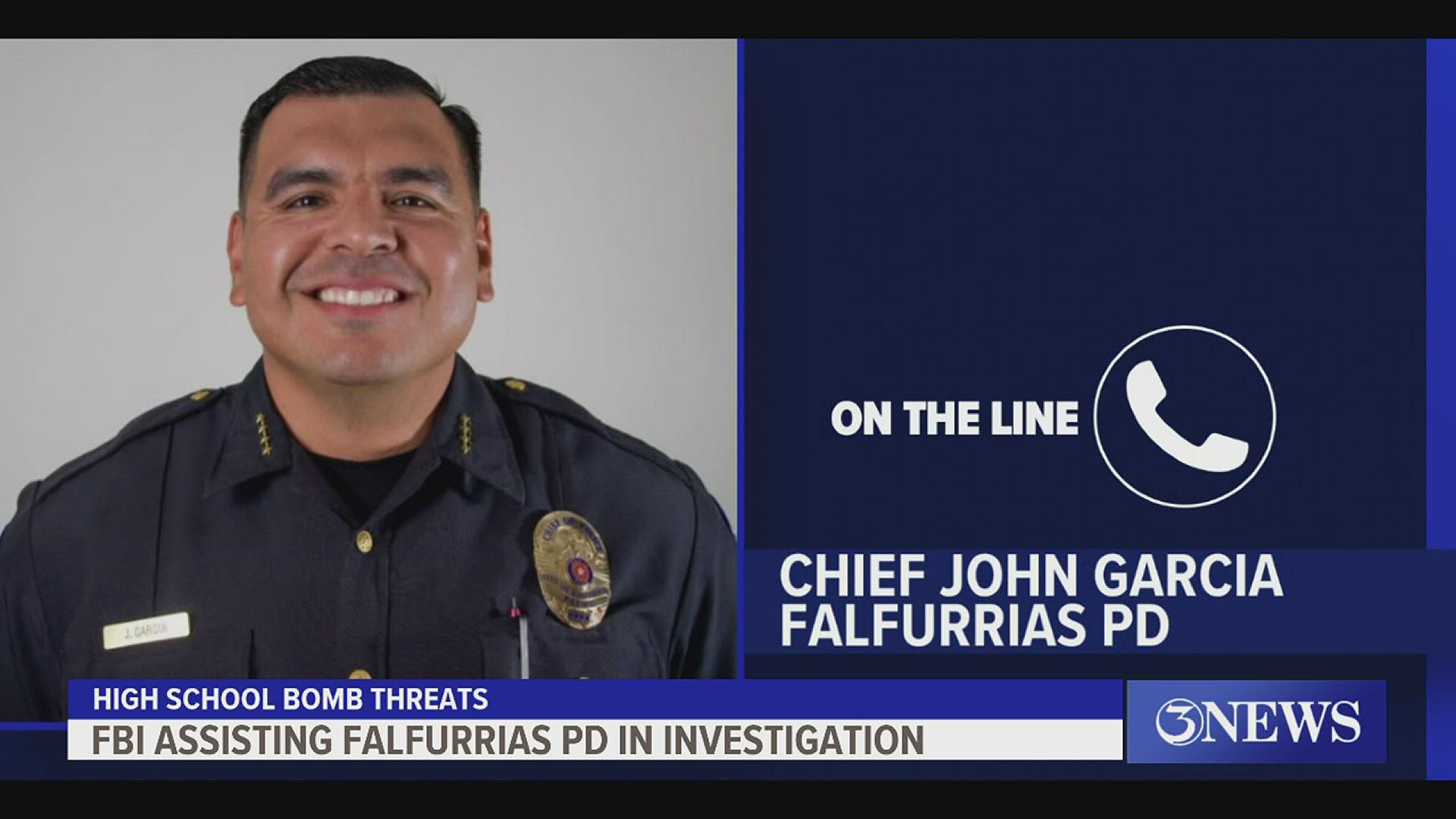FALFURRIAS, Texas — Students and staff at Falfurrias High School were forced to evacuate for a second day in a row due to a bomb threat, according to the superintendent and Falfurrias Police Department.
Students and staff were evacuated to the elementary campus, Falfurrias PD said in a social media post.
Police Chief John Garcia said it was an on-campus officer who discovered the threatening note in a school bathroom which prompted their response and search of the school.
Wednesday's threat also involved a note left in a bathroom.
"This one was a note found in the, in the, in the restroom. Ok, so there was a note saying that they were going to bomb the school," Superintendent of Brooks County ISD Maria Rodriguez-Casas said.
Senior agent Glenn Folsom with the FBI Office out of Corpus Christi said his office is assisting the Falfurrias Police Department in this case and that it will be investigated to the fullest extent possible.
"Every single hoax, every single threat being a hoax or not is going to draw a significant response from law enforcement. It's going to be treated seriously and in doing so we are going to bring every assets we feel to bring to immediately respond to that threat, depending on the threat that comes in, that could be tactical teams bomb dogs, bomb techs, its going to be a significant number of investigators," said Sr. Agent Folsom.
Since November 14, Falfurrias High School has received 7 threats which resulted in 5 evacuations.
While many times the threats turn out to be hoaxes, Sr. Agent Folsom said the person found to be responsible can still face serious charges.
"There's a number of criminal charges including state terroristic threat charges which have been levied against even juveniles who have made threats to the school or other organizations," Sr. Agent Folsom said.
Here are a few examples of serious threats that the FBI and partners have investigated:
- Two young men in Kentucky created a social media account in someone else’s name and used it to make threats against a public school, which police investigated and determined to be a hoax. An 18-year-old was sentenced to 21 months in prison and a 19-year-old was sentenced to 27 months.
- A young man in Texas used social media and a phone to issue threats against schools in Minnesota. He also called in fake hostage situations, known as “swatting.” He was arrested, pleaded guilty, and was sentenced to more than three years in federal prison. He was 19 at the time of sentencing.
- A 21-year-old South Carolina man was sentenced to one year in federal prison after he sent text messages claiming there was a bomb in the parking lot of a Veterans Affairs Medical Center in the state.
- An 18-year-old North Carolina man was sentenced to 22 months in federal prison and was ordered to pay restitution after he broadcast himself on the Internet calling in bomb threats to various public places, including schools, colleges, and FBI offices.
Chief Garcia said he is grateful for the additional assistance in the case but it will ultimately take the community's involvement to help solve the case.
"Parents need to start asking their kids questions and get us information if we can. I think they will come through and get to the bottom of this," said Chief Garcia.
What Should I Do?
- Don’t ever post or send any hoax threats online…period.
- If you are a target of an online threat, alert your local law enforcement immediately.
- If you see a threat of violence posted on social media, immediately contact local law enforcement or your local FBI office. Members of the public can always submit a tip to the FBI at tips.fbi.gov.
- Notify authorities but don’t share or forward the threat until law enforcement has had a chance to investigate—this can spread misinformation and cause panic.
- If you are a parent or family member, know that some young people post these threats online as a cry for attention or as a way to get revenge or exert control. Talk to your child about the proper outlet for their stress or other emotions, and explain the importance of responsible social media use and the consequences of posting hoax threats.
Subscribe to our YouTube channel for your daily news and exclusive extended interviews.
Do you have a news tip? Tell 3!
Put your name and contact information below, or email tell3@kiiitv.com, so we can get in touch with you about your story should we have questions or need more information. We realize some stories are sensitive in nature. Let us know if you'd like to remain anonymous.
If you do not have a photo/video to submit, just click "OK" to skip that prompt.

